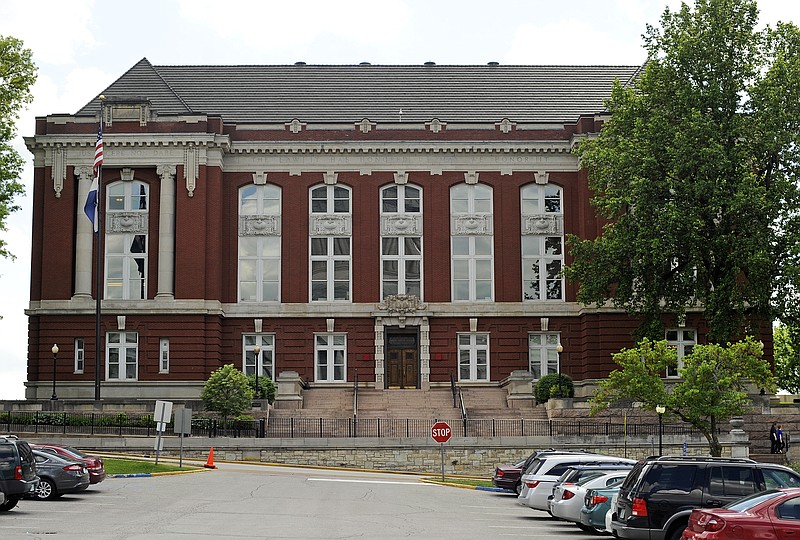Missouri Supreme Court judges on Tuesday heard a lawsuit brought by civil rights groups over voting requirements during the COVID-19 pandemic.
The Missouri NAACP and Missouri League of Women Voters filed the lawsuit to challenge the constitutional validity of absentee voting legislation, which was approved by the Missouri Legislature on the final day of session in May and later signed by Gov. Mike Parson.
The law expands absentee voting by mail through the rest of the year, but unless an absentee voter is incapacitated or confined due to illness or has contracted coronavirus or is considered at-risk for the disease - according to a legally defined list of specific age, living or health conditions - then by-mail absentee voters still must have their ballot envelopes notarized.
Non-absentee voting by mail - an option open to anyone - also requires a voter's ballot envelope be notarized.
The organizations' lawsuit challenged the law's notarization requirement.
Cole County Judge Jon Beetem ruled against the plaintiffs late last month and denied their request for an injunction because he found a claim the notarization requirement poses an unconstitutional health risk to voters was unsupported by evidence - social distancing and other precautions work, and no instance of any transmission of COVID-19 during a notarization was provided.
Attorney Sophia Lin Lakin, of the American Civil Liberties Union, argued Tuesday on behalf of the plaintiffs, saying the law acknowledges the medical reality of the health risks present for voters - which Lakin said have only gotten worse over time - and "the law doesn't do enough to protect Missourians' right to vote."
Lakin asked the court that all ballots be counted this election, regardless of whether they're notarized.
Lakin is also the deputy director of the ACLU's Voting Rights Project.
The plaintiffs' arguments before the court also included that the trial court failed to consider health and logistical burdens on voters associated with notarization, and the trial court erred in entering a ruling against the weight of the evidence.
Beetem had ruled additional burdens related to notarization - including "voter confusion, alleged notary scarcity, alleged lack of photo IDs to obtain notarization, alleged disparate impact on rural voters, and alleged disparate impact on minority voters" - were introduced to the case too late and did not relate to the parties in the case.
John Sauer, the attorney arguing on behalf of the defendants - who works for the state attorney general's office - argued there was no specific claim for those alternative theories being other burdens.
Lakin argued the Supreme Court could look at the evidence and make its own conclusions, regardless of the trial court's findings.
The lawsuit's central claim is the law doesn't protect Missouri voters enough from the health risks of COVID-19, to which Sauer said the trial court found that during the August 2020 primary, the secretary of state and local election authorities provided a safe experience. He added they would continue to do so in the November election - with no evidence of a single case of transmission during in-person voting or notarization.
When asked what's impractical about Lakin's request that all votes be counted, regardless of whether notarized, Sauer said the vast majority of Missouri voters would have already received clear, emphatic instructions otherwise,
Sauer added, with tens of thousands of voters having already cast their ballots, changing the law now would create two different standards for voters during the same election, which could also create confusion that deters people from voting.
Beetem had said something similar in his ruling: "Invalidating the notarization requirement, and re-printing thousands of ballot envelopes, during a process that is already underway threatens to create confusion among voters and local election authorities, and it would subject Missouri voters to different legal standards during the same election, depending on when they cast their absentee or mail-in ballot."
Lakin argued, however, the framers of the Missouri Constitution took special care to protect voting and reiterated again that all ballots should be counted.
The court did not immediately indicate when a judgment may come down.
A group of doctors and epidemiology professors, many from the Washington University School of Medicine - including the department's chairwoman, who's also physician-in-chief for Barnes-Jewish Hospital - and a public a health professor from Saint Louis University's College for Public Health and Social Justice, filed an amicus brief arguing "The relief sought by appellants - an order allowing absentee voting without notarization by those self-isolating to avoid spreading or being infected with the virus that causes COVID-19 - is necessary in light of the unique dangers posed by the virus and the features of polling locations and the notarization process that pose significant risks of transmission."
There are two other lawsuits before courts this fall over Missouri voting laws.
Cole County Judge Dan Green continued to hear arguments Tuesday in the lawsuit brought by the Washington, D.C.-based American Women organization and three Missouri plaintiffs from St. Louis and Webster Groves against Missouri Secretary of State Jay Ashcroft over five election laws they say make it difficult or impossible for Missourians to vote - including the notarization requirement.
That lawsuit was scheduled to continue today and might continue the rest of the week.
No trial date had been set as of Tuesday afternoon in a third case, filed last month in federal court against Ashcroft and county election authorities by the Organization for Black Struggle, St. Louis A. Philip Randolph Institute, Greater Kansas City A. Philip Randolph Institute, St. Louis section of the National Council of Jewish Women and Missouri Faith Voices. Their lawsuit includes seeking to prevent election authorities from not counting otherwise valid mail-in or absentee ballots postmarked by Election Day and received by noon the Friday after Election Day; prevent authorities from rejecting a ballot for certain mistakes; and give voters a chance to fix certain mistakes on their ballot envelopes.


